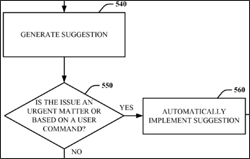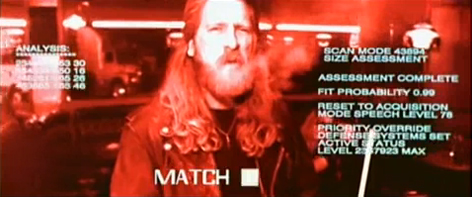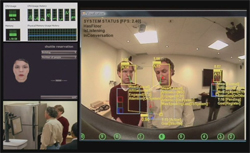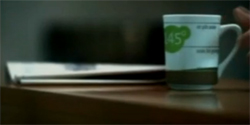
Would Microsoft's 'guardian angel' turn our brains to mush?

TechFlash reported that Microsoft has been granted a patent on an "intelligent personal agent" that could predict a user's wants and actions. If the user is at a shopping mall and the software's artificial intelligence knows it's lunchtime, the "guardian angel" could search for nearby restaurants that serve the user's preferred foods, choose a cuisine based on the user's recent meals, check for seating availability, and make lunch reservations.
This is an example laid out in Microsoft's 2006 patent application, which lists Bill Gates and Ray Ozzie as two of the inventors.
But I know of an existing device that already has this function. It's called the human brain.
Call me pessimistic if you want, but do we really need the artificial intelligence of a digital guardian angel to supplant the organic intelligence of our own selves?
Sure, in the scenario above, it could be convenient for a device to do all the work for us. If you're shopping on a tight schedule, you may not have a spare two minutes to think about what you want to eat for lunch. So let's look at another scenario laid out in the patent.
The "intelligent personal agent" could, according to the patent summary, "assist in social interactions by indicating whether the user has met an individual before, to gauge the appropriateness of jokes or comments given the demographics of the audience."
More from the patent:
The guardian angel combines such environmental factors with past, present, and/or future preferences as well as attributes of the user to suggest options in a decision-making process. A utility-based analysis can be performed in connection with making an automated decision as a function of expected benefit versus cost of making an incorrect decision.
Put the intelligent personal agent into Scan Mode 43894 and it will search for somebody nearby with a similar clothes size to yours. Oh, I'm sorry, I got Microsoft's guardian angel confused with the T-800.

OK, to be fair, surely the goal isn't to supplant the human brain, but to supplement it.
The guardian angel can continuously monitor a variety of factors in a user's environment, including aspects related to: location, time, velocity, acceleration, local commerce/retail structures, altitude, temperature, biographical information, proximity/relationship to other objects, capability of other objects, application/relevancy/usage, and Internet/email configuration. Mechanical and/or electromagnetic devices may be used to monitor a user's physical/mental state within the context of a particular environment. For example, a sensor can be attached to the user to monitor his/her heartbeat with respect to his/her current activity (e.g. a higher heartbeat is normal during exercise, while a lower heartbeat is normal during rest). Furthermore, a device may directly interact with a brain without bulky attachments.
All right. I think I get it now. Have no common sense? Got no social skills? Hook your brain up to your guardian angel and make your life easier.
Microsoft's "virtual receptionist," an early application of this guardian-angel idea, hits a little too close to "Judgment Day" for my taste. The software, which Microsoft Research showed off at TechFest 2009, includes face-recognition technology that even looks like the Terminator's heads-up display.

Click to enlarge
I felt another small shudder when Microsoft started talking about how the technology behind Project Natal, the upcoming controller-less add-on for Xbox 360, could be applied beyond gaming. You could walk up to a computer and it would immediately recognize you, interact with you in your preferred candor, and present you with a virtual world in which you socialize with actual humans and computers alike.
After watching Microsoft's "Vision of the Future 2019" promotional video dozens of times, I started rolling my eyes whenever I saw the coffee mug that displays temperature and how full the cup is. I can already ascertain this data by simply picking up a coffee mug. Does Redmond really think we're this dependent on technology?
Call me old-fashioned if you want, but I get along just fine with my built-in sensory system of eyes, ears, nose and nerves. When I'm hungry, I decide what food to eat. When I'm at a party, I myself gauge the appropriateness of a joke. When I make an incorrect decision, I don't sit there wishing I'd had software to help me avoid it, I learn from it.
Full disclosure: I'm playing devil's advocate here. Certainly, in some situations an intelligent personal agent could be helpful. But I just can't shake the feeling that such technology could be taken too far.

And perhaps it's inevitable.
Am I way off-base? Have I watched too many science fiction movies? Or are you also a bit skeptical of whether we humans really need – or should have – technology to do our thinking for us?
Or perhaps it's too late? Heck, my iPhone can probably already do half of this stuff.
